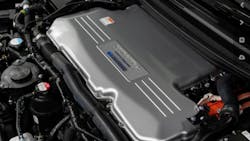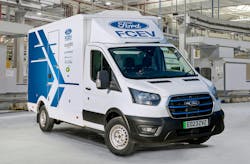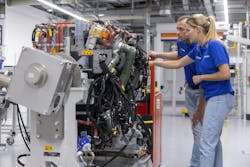Are Hydrogen Fuel Cell Vehicles in Your Future?
Most likely you have heard of hydrogen fuel cell vehicles (HFCV), but they are usually not showstoppers, unlike battery electric vehicles (BEV), which seem to get all the attention these days. In the consumer media, hydrogen fuel cell vehicles have taken a back seat to battery electric and hybrid vehicles for some time now. However, this is not the case for automobile manufacturers and joint ventures—they are researching and testing hydrogen fuel cell commercial and vocational vehicles.
An HFCV uses the same kind of electric motor to turn the wheels that a BEV does. But instead of using a battery for power, an HFCV is powered by a fuel-cell stack, in which pure hydrogen (H2) passes through a membrane to combine with oxygen (O2) from the air. This creates electricity (and water vapor) that powers the wheels. A fuel-cell vehicle is technically a series hybrid, which is why they can be classified as fuel-cell hybrid electric vehicles (FCHEV).
HFCVs are smooth and quiet to drive—and the best benefit is that they do not emit carbon dioxide or other harmful exhaust out their tailpipes, only water vapor is emitted. And it only takes about five minutes to refuel them for a long drive. Sounds great, right? So why have not these HFVCs been promoted as much as EVs?
There are many challenges to overcome. The biggest being the availability of hydrogen fuel.
According to the US Department of Energy, as of 2023, there are 59 open retail hydrogen stations in the United States and there are at least 50 stations in various stages of planning or construction. Most of the existing and planned stations are in California, with one in Hawaii and five planned for the northeastern states. On top of this, the cost of hydrogen is pricey. To read more about the pros and cons of hydrogen-fueled vehicles visit Hydrogen Fuel-Cell Vehicles: Everything You Need to Know at www.caranddriver.com/features/a41103863/hydrogen-cars-fcev/.
European R&D
Although there are challenges, automotive companies continue researching and testing. Last year Ford announced a three-year hydrogen fuel cell E-Transit trial in Essex, England. Ford is spearheading research into the potential for hydrogen as an on-board energy source for its E-Transit. The project will establish if hydrogen fuel cell technology can deliver more zero-emission range to heavy-use E-Transit customers travelling many miles with maximum loads, ancillary equipment such as chillers, and with limited charging opportunities during the working shift.
Part funded by the Advanced Propulsion Centre (APC), Ford’s consortium of six automotive technology leaders and fleet operator partners will help to determine the supporting hydrogen refueling infrastructure required. Ford Pro, the company’s commercial vehicle and services division, will use the pilot to expand its conversion expertise, supported by engineers and E-Transit specialists from Dagenham and the company’s nearby Dunton Technical Centre in Essex.
“Ford believes that the primary application of fuel cells could be in its largest, heaviest commercial vehicles to ensure they are emission-free, while satisfying the high daily energy requirements our customers demand,” said Tim Slatter, Chair of Ford in Britain.
Stellantis recently announced its Pro One commercial vehicle lineup expanded its production capabilities of hydrogen fuel cell vehicles with in-house production on both mid-size and large van offers in Hordain, France, and Gliwice, Poland.
“The action to bring hydrogen fuel cell mid-size vans and add fuel cell large vans to our production lines is a proof point of our commitment to maintain the lead in cutting-edge hydrogen technology and make it available to our most demanding customers,” said Jean-Michel Billig, Stellantis Chief Technology Officer, Hydrogen Fuel Cell Vehicle Development.
The fuel cell versions of the commercial vans are built on the technology used in the zero-emission BEV variants of the vehicles, with the added advantages of short refueling times and no sacrifice of payload capability.
Hydrogen fuel cell technology plays an important role in the Stellantis zero-emission propulsion roadmap. Launched in 2021, Stellantis is the first manufacturer in the world to market this type of vehicle. In 2023, Stellantis became an equal one-third shareholder in Symbio, a leading hydrogen technology company with operations in Europe and the United States.
Momentum in the US
General Motors and Honda have started hydrogen fuel cell production at their joint venture plant in Brownstown, Michigan. This is a step towards offering alternative zero-emissions solutions beyond battery-electric vehicles.
According to a CNBC report, executives for both automakers and the Fuel Cell System Manufacturing LLC joint venture, said the start of commercial production marked a historical moment for the technology, which has been under development for decades. And it comes at a key time for fuel cells.
GM’s first applications are expected to be for backup power stations and large trucks in Autocar’s fleet. Honda’s fuel cell vehicle, which will be sold mostly in California because the state has the most hydrogen refueling stations, is expected to be introduced this year.
Autocar Industries LLC and GM signed a joint development agreement to create a range of zero tailpipe emissions vocational vehicles powered by GM’s HYDROTEC power cubes. Autocar, a market leader in customized vocational trucks, views this initiative as an important expansion in offering robust, zero tailpipe emissions solutions to customers. Fuel cell technology offers an additional energy propulsion option to support Autocar’s vocational customers’ move toward EPA requirements. Hydrogen fuel cells are a key component of GM’s electrification strategy which extends beyond battery-powered passenger vehicles.
Fuel Cells and Trucks Showcased at CES 2024
Hydrogen fuel cells and HFCVS were popular exhibits at this year’s Consumer Electronics Show (CES) in Las Vegas. Bosch Mobility, Hyundai Motor Company, and startups Nikola and Croft Motors were in full force at the popular electronics show.
Nikola exhibited one of its first US-built hydrogen trucks that is starting to ship to customers. As you may recall, Nikola has somewhat of a sordid past. In December 2023, Nikola’s founder Trevor Milton was sentenced to four years in prison for exaggerating claims on zero-emission trucks via social media and media outlets.
Another startup exhibiting at CES, Croft Motors, is developing “rugged” hydrogen-powered vehicles. The startup showcased a prototype SUV with an anticipated 1,000 miles of driving range, along with plans for developing distributed fueling products to support rapid hydrogen vehicle adoption, according to Robots.net.
At Bosch’s exhibit, the company presented technology and applications that can not only make life easier, safer, and more convenient, but also more sustainable. Bosch is investing in technologies along the hydrogen value chain. The focus is currently on the mobile fuel cell, which recently went into volume production in Stuttgart, Germany. This lies at the heart of the powertrain system for heavy vehicles. Bosch has already received its first orders from truck manufacturers in Europe, the US, and China.
According to Bosch, countries and industries around the world are investing in hydrogen technologies. The US government, for example, is pushing ahead with the development of H2 infrastructure and investing 7 billion dollars in the construction of hydrogen hubs.
Also, during the show, Hyundai Motor Group presented its vision for a hydrogen-powered, software-driven transformation beyond mobility applications. For nearly half of the company’s existence, Hyundai has been at the forefront of the hydrogen momentum, achieving many firsts, including some of the first mass-produced fuel cell electric vehicles (FCEVs). Hyundai sees hydrogen as the path to a sustainable future, as it is both clean and accessible.
Candace Roulo is a graduate of Michigan State University’s College of Communication Arts & Sciences, has 20 years of experience in the media and construction industries, and is a past Senior Editor for CONTRACTOR. She covers a variety of mechanical contracting topics, from sustainable construction practices to continuing education to best business practices.
About the Author
Candace Roulo
Candace Roulo, senior editor of CONTRACTOR and graduate of Michigan State University’s College of Communication Arts & Sciences, has 15 years of industry experience in the media and construction industries. She covers a variety of mechanical contracting topics, from sustainable construction practices and policy issues affecting contractors to continuing education for industry professionals and the best business practices that contractors can implement to run successful businesses.


